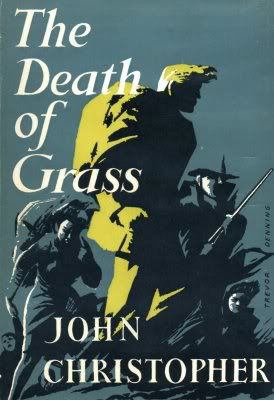
Back in high school, I aced every exam in US History. It was still history, after all, despite its appalling lack of knights, samurai, and musketeers. However, test scores weren't enough for my teacher, who insisted on basing most of our grade on classroom participation. The class started at 7:30AM. There was no way in Hell I was participating in anything at that hour.
Luckily, the teacher offered extra credit for book reports on various titles he had selected and supplied for the classroom. In addition to novels set in various eras of American history, a bunch of utopian and dystopian novels were also on the approved reading list. I stuck with the dystopian books, no surprise, and went through the small collection in no time at all. I ended up suggesting titles from my own collection, though not all of them were approved.
Some of the works, like 1984 and Brave New World, were only absorbed long enough to crank out a report before being purged from my memory banks. Others never even made it that far; I'm embarrassed to admit that I gave up on a couple of classics, including A Canticle for Leibowitz and A Clockwork Orange, within a few dozen pages. But there were a few books that stuck with me for a long time. Neville Shute's On the Beach. Andrew J. Offut's Burgess-inspired The Castle Keeps. And John Christopher's No Blade of Grass.
The heroes in most doomsday stories represent civilization in the wake of chaos. They uphold the morals and ethics of the old ways. (Even Hell Tanner, the gritty anti-hero of Roger Zelazny's Damnation Alley, felt certain obligations as Earth's last surviving Hell's Angel.) Atrocities are something the bad guys commit.
This isn't the case with No Blade of Grass. Rather than stalwarts whose morality is only tempered by the fires of disaster, its protagonists are ordinary people who find themselves utterly transformed by catastrophe. In the name of survival, they commit acts that they themselves would normally find abhorrent. One of the band's most valuable members could easily be the villain in another story; for some people the group comes across, he is. Rather than focus on how society adapts and survives after a global calamity, Christopher explores how individuals might react, how they might be changed by cataclysmic events far beyond their control. No Blade of Grass is a grim but worthwhile read.
It's also darn hard to find, apparently, so I'm offering the next best thing. It's a very recent (March, 2009) four-part BBC Radio adaptation of Christopher's novel under its original name, The Death of Grass. Faced with the collapse of civilization in the wake of a worldwide famine, a small band of city dwellers attempt to make their way to a remote valley and the hope of sanctuary.
Click on the link below to be taken to the Rapidshare download page.


1 comments:
Thanks very much for this and also the movie.
Greetings from Belgium.
Post a Comment